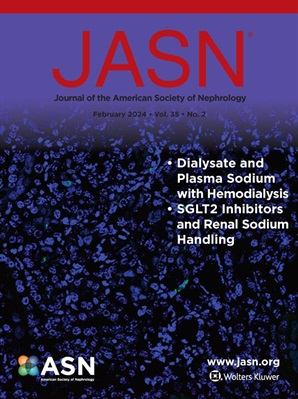Tubular FoxP2 and Kidney Fibrosis.
IF 10.3
1区 医学
Q1 UROLOGY & NEPHROLOGY
Journal of The American Society of Nephrology
Pub Date : 2025-04-01
Epub Date: 2024-12-10
DOI:10.1681/ASN.0000000576
引用次数: 0
肾小管 FoxP2 与肾脏纤维化
背景:肾纤维化是导致肾衰竭的进行性慢性肾病(CKD)的最终共同途径,目前的治疗策略有限。叉头盒P2 (Foxp2)转录因子通过其与上皮-间质转化(EMT)过程的关联,参与器官发育和肿瘤发生。在这项研究中,我们发现Foxp2在肾纤维化中的新作用。方法:采用人肾活检法检测Foxp2的表达。通过LoxP-Cre转基因操作产生小管特异性Foxp2敲除小鼠,并应用于小鼠进行性CKD模型,包括单侧输尿管梗阻(UUO)和单侧缺血-再灌注损伤(UIRI)。用培养的肾小管上皮细胞分析潜在的细胞机制。结果:IgA肾病、膜性肾病和糖尿病肾病患者CKD人肾活检的肾小管核中Foxp2表达明显升高。在再现进行性CKD的小鼠单侧输尿管梗阻和单侧缺血-再灌注模型中,小管特异性缺失Foxp2可减轻肾脏炎症和小管间质纤维化,并伴有细胞周期阻滞的减少。在小鼠小管上皮细胞中,TGF-β通过Smad3信号上调Foxp2的表达,而Foxp2的敲低抑制TGF-β诱导的上皮向间质转化和细胞外基质蛋白的积累。机制上,Foxp2过表达抑制小管细胞增殖,诱导G2/M细胞周期阻滞。通过染色质免疫沉淀测序,我们发现Foxp2靶基因富集于PI3K/Akt和TGF-β信号通路,进一步揭示了Foxp2直接调控参与上皮-间质转化和细胞周期阻滞的胶原-1、E-cadherin和p21的转录活性,从而促进了纤维化过程。结论:我们的研究结果表明Foxp2在小鼠UUO和UIRI中通过激活肾小管上皮到间质转化和细胞周期阻滞促进肾脏纤维化,促进CKD的进展。
本文章由计算机程序翻译,如有差异,请以英文原文为准。
求助全文
约1分钟内获得全文
求助全文
来源期刊
CiteScore
22.40
自引率
2.90%
发文量
492
审稿时长
3-8 weeks
期刊介绍:
The Journal of the American Society of Nephrology (JASN) stands as the preeminent kidney journal globally, offering an exceptional synthesis of cutting-edge basic research, clinical epidemiology, meta-analysis, and relevant editorial content. Representing a comprehensive resource, JASN encompasses clinical research, editorials distilling key findings, perspectives, and timely reviews.
Editorials are skillfully crafted to elucidate the essential insights of the parent article, while JASN actively encourages the submission of Letters to the Editor discussing recently published articles. The reviews featured in JASN are consistently erudite and comprehensive, providing thorough coverage of respective fields. Since its inception in July 1990, JASN has been a monthly publication.
JASN publishes original research reports and editorial content across a spectrum of basic and clinical science relevant to the broad discipline of nephrology. Topics covered include renal cell biology, developmental biology of the kidney, genetics of kidney disease, cell and transport physiology, hemodynamics and vascular regulation, mechanisms of blood pressure regulation, renal immunology, kidney pathology, pathophysiology of kidney diseases, nephrolithiasis, clinical nephrology (including dialysis and transplantation), and hypertension. Furthermore, articles addressing healthcare policy and care delivery issues relevant to nephrology are warmly welcomed.

 求助内容:
求助内容: 应助结果提醒方式:
应助结果提醒方式:


